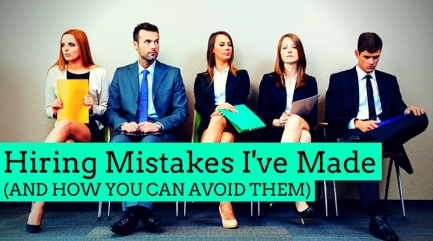|
A new hire always comes with its own set of risks, investments and considerations as well as the potential for mistakes.
|

|
|---|---|
|
Hiring a new team member is one of the most important decisions a business owner or manager will make. A new hire always comes with its own set of risks, investments and considerations as well as the potential for mistakes. Success depends on selecting the candidate that meets the qualifications, fits in with the existing team and makes it better through his or her work practices. While it is an exciting time, it can also be an extremely stressful and nerve-wracking process. If you're gearing up to start the hiring process at your company, here are six common mistakes you should avoid. In order to determine if a candidate meets the qualifications of the position, you have to identify and express what those qualifications are.
"It's important to detail the specific job requirements and desired personal characteristics, creating a 'hiring scorecard' that can be used in screenings and interviews to determine if a candidate can fulfill the requirements of the job," Burton Goldfield, president and CEO of TriNet, wrote in an Entrepreneur article. Make a list of the job responsibilities and a corresponding list of the skills, knowledge, experience and talent the person needs to do those tasks to your expectations. With a clear idea of what you need, it will be easier to see those skills in the candidate.
Wherever there's an open position, there's an eager group of individuals offering their friends and relatives as "perfect" candidates for the job. It may be tempting to hire family members and friends, especially in a small startup setting, but a close relationship with a person doesn't automatically qualify them as a good employee. Heidi Ganahl, the CEO and founder of dog-boarding franchise Camp Bow Wow, learned this the hard way when she first started her company. "I hired one of my best friends, who ended up making personal charges on the company credit card and withdrawals from my bank account," Ganahl said. "It taught me a lesson that hiring someone just because you have a relationship is not a great idea. I lost a close friend, a lot of money at one point, and a lot of time."
Some potential employees may seem perfect on paper or during the interview, only to turn out to be a complete disaster later on. Ted Karkus, the CEO of Cold-EEZE manufacturer Prophase Labs, noted that employers frequently view candidates in terms of whether or not they like them, as opposed to matching their strengths with the responsibilities of the position. While you can't know for sure how a new employee will perform once hired, you can mitigate the risk of a bad hire by not factoring first impressions into your decision. "It's so easy to assume that a firm handshake and good eye contact means someone is competent across the board," added Jason Berkowitz, vice president of client services at recruitment outsourcing firm Seven Step RPO. "Don't use the interview to try to validate a good or bad snap judgment [of a candidate]. Hiring managers should actually try to disprove their initial impression. If you like someone off the bat, look for reasons they aren't right for the job. If you dislike someone, look for reasons why they are right for the job." Most hiring managers are aware that certain explicit questions about age, ethnicity, religion and other personal topics are off-limits during an interview, but some seemingly innocent questions can really get you in trouble. "There are a lot of hot button questions that can create problems," said Matthew Kaufman, head of attorney services at Rocket Lawyer. "The federal government prohibits employers from making hiring decisions on the basis of race, ethnicity, religion, sex, disability, veteran status, national origin, age, political affiliation or genetic information. If you refuse to provide someone employment they may come back to you and claim it's because of something they found out when you were questioning them." Kaufman provided some not-so-obvious examples of questions that could potentially be interpreted as discriminatory:
Berkowitz emphasized the importance of training hiring managers to not only conduct effective interviews, but also to be legally compliant to avoid this problem.
A candidate may have an impressive résumé, but how do you know he or she will be the right fit? Conducting background checks and calling previous employers for references can save you a lot of hassle. "Always vet the person's character and don't settle for hiring people who look qualified," Ganahl told Business News Daily. "It is also helpful to start them out as a consultant and make that person prove his or herself [before hiring full time]."
One of the most critical mistakes a company can make is failing to define its hiring policies before beginning an employee search. An unclear policy can confuse the hiring managers and candidates at best, or invite legal troubles at worst, especially when it comes to contract workers and exempt versus nonexempt employees. "Employers should all have an employee handbook and a hiring policy in place," Kaufman said. "This helps identify issues to avoid and serves as a legal shield to potential liability in the future." Hiring new employees means your business is thriving and that is a good thing. The wrong choice can cost you time, money, customers and credibility. Make the selection wisely to continue to pursue business growth while providing a positive work experience for the entire team.
|
|
Home >> Career Resource >> Articles
6 Common Hiring Mistakes and How to Avoid Them
Related Career Resource
By : Adminsitrator | June 17, 2014
By : Admin | August 31, 2016
By : Admin | August 31, 2016







